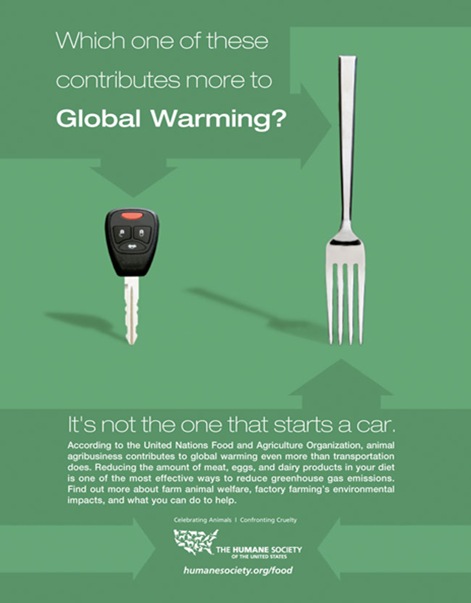FYI, I’m a Vegetarian…

EVER since ‘An Inconvenient Truth,’ Al Gore has been the darling of environmentalists, but that movie hardly endeared him to the animal rights folks. According to them, the most inconvenient truth of all is that raising animals for meat contributes more to global warming than all the sport utility vehicles combined.

Read the Full NY Times Article at: Trying to Connect the Dinner Plate to Climate Change
 AFP – Global warming may carry a higher risk of flooding than previously thought, according to a study released on Wednesday by the British science journal Nature.
AFP – Global warming may carry a higher risk of flooding than previously thought, according to a study released on Wednesday by the British science journal Nature.
Flooding risk from global warming badly under-estimated: study (AFP)
Another case of American Government thinking they are better than the rest of the world for absolutely no reason other than to promote the crappy industries that destroy our environment and make politicians rich.
 AP – The United States and Europe are working together to tackle global warming, the chief U.S. climate negotiator said Wednesday, deflecting growing criticism within the EU and the developing world over Washington’s perceived go-it-alone stance.
AP – The United States and Europe are working together to tackle global warming, the chief U.S. climate negotiator said Wednesday, deflecting growing criticism within the EU and the developing world over Washington’s perceived go-it-alone stance.
U.S. plays down split with EU on climate (AP)
AP – Ireland’s average temperature has been rising at twice the global rate since the early 1980s and parts of the country are becoming wetter and more prone to flooding due to climate change, a government-funded report said Wednesday.
Ireland getting hotter, wetter (AP)
We?ve written plenty about the growing biofuel market and the rising concern over the sustainability of corn or wheat ethanol and soy biodiesel production. Here?s an A to Z of alternative materials and innovative processes that can turn that biomass into fuel. From milk-based ethanol, to termite intestines that help make biofuels, check out these 26 sources.
 Apples: Fructose, the sugar found in apples and other fruit, can be converted into a fuel contains more energy than ethanol, say scientists from the University of Wisconsin-Madison. The fuel is called dimethylfuran or DMF, and it supposedly has a 40 percent greater energy density than ethanol.
Apples: Fructose, the sugar found in apples and other fruit, can be converted into a fuel contains more energy than ethanol, say scientists from the University of Wisconsin-Madison. The fuel is called dimethylfuran or DMF, and it supposedly has a 40 percent greater energy density than ethanol.
 Beer: Researchers at The University of Abertay Dundee?s School of Contemporary Sciences are investigating ways to turn waste residues from beer and whiskey making processes into biofuels. Meanwhile, the New Belgium Brewery in Fort Collins, Colorado, teamed up with Solix Biofuels to make use of the waste CO2 from the booze.
Beer: Researchers at The University of Abertay Dundee?s School of Contemporary Sciences are investigating ways to turn waste residues from beer and whiskey making processes into biofuels. Meanwhile, the New Belgium Brewery in Fort Collins, Colorado, teamed up with Solix Biofuels to make use of the waste CO2 from the booze.
Continue reading more at: An A to Z of the Biofuel Economy





 Apples: Fructose, the sugar found in apples and other fruit, can be converted into a fuel contains more energy than ethanol, say scientists from the University of Wisconsin-Madison. The fuel is called dimethylfuran or DMF, and it supposedly has a 40 percent greater energy density than ethanol.
Apples: Fructose, the sugar found in apples and other fruit, can be converted into a fuel contains more energy than ethanol, say scientists from the University of Wisconsin-Madison. The fuel is called dimethylfuran or DMF, and it supposedly has a 40 percent greater energy density than ethanol.
 Beer: Researchers at The University of Abertay Dundee?s School of Contemporary Sciences are investigating ways to turn waste residues from beer and whiskey making processes into biofuels. Meanwhile, the New Belgium Brewery in Fort Collins, Colorado, teamed up with Solix Biofuels to make use of the waste CO2 from the booze.
Beer: Researchers at The University of Abertay Dundee?s School of Contemporary Sciences are investigating ways to turn waste residues from beer and whiskey making processes into biofuels. Meanwhile, the New Belgium Brewery in Fort Collins, Colorado, teamed up with Solix Biofuels to make use of the waste CO2 from the booze. 


